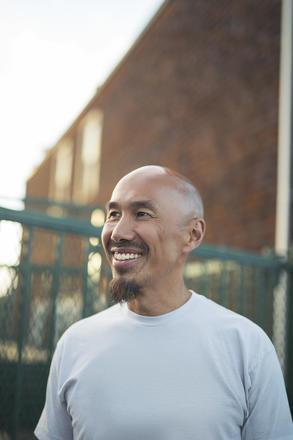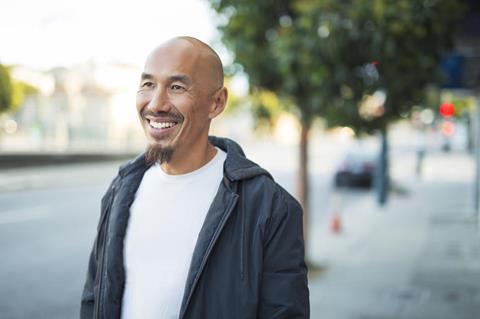Francis Chan left his thriving US megachurch, turned his back on the fame that ministry had brought him and moved his family to a developing country. But whatever you do, don’t call him a radical

Am I part of the problem? That’s the question Francis Chan asked himself as he surveyed his thriving megachurch. Cornerstone Church in California had grown from 30 to 6,000 congregants in the 15 years since Chan planted it. Yet he wasn’t satisfied.
He was leading a typical Western, evangelical church, and that, according to Chan, was exactly the problem. Everything centred around “a speaking gift and a sermon”, he says. In other words, people were flocking to preacher-man Chan, rather than seeking an encounter with God. When this magazine last interviewed him, in 2010, he put it this way: “One of the problems at our church is when I hear the words ‘Francis Chan’ more than I hear the words ‘Holy Spirit’.”
Chan’s first book Crazy Love (David C Cook) was published a decade ago and sold thousands of copies on both sides of the Atlantic. He quickly developed a reputation for passionate preaching that raged against lukewarm Christianity, and became a much in-demand speaker at Christian conferences. Uncomfortable with his increasing level of fame, and unsettled by a church culture at Cornerstone that he was struggling to change, Chan moved his family to the other side of the world. His prediction that Cornerstone could and would survive without him was proven true.
As he spent time in Asia, among persecuted Christians, the leader caught a fresh vision of what church should be like. Now the 51-yearold is back in California, but he’s not involved with the megachurch he founded. Instead, he’s started a new church-planting network called We Are Church (wearechurch.com). Each church in the network is made up of ten to 20 people. Chan says the smaller size means Christians are able to “truly know each other and carry each other’s burdens”. Each church meets in a person’s home, so there’s no need to fundraise in order to purchase large buildings, and the church leaders are all volunteers, so they don’t need to take a salary. All the money that is given to each church is spent on the poor and on mission and the wider church family is “constantly evaluating” whether it’s time to “multiply” (ie start another congregation), so every pastor is charged with training another leader to follow in their footsteps.
One of the worst things that can happen is for life to be easy and comfortable
In his new book Letters to the Church (David C Cook), Chan is bold, brash and brilliant. He explains how he often asks church leaders what their congregants expect on a Sunday. Typical replies include: “A really good service, strong agespecific ministries, a certain style/ volume/length of singing, a well communicated sermon…parking… coffee.” He then asks the same leaders to list biblical commands about church. This time, the responses are: “Love one another as I have loved you” (John 15:12), “Look after widows and orphans in their distress” (James 1:27) and “Make disciples of all nations” (Matthew 28:19). “What would upset your people more?” Chan asks. “If you didn’t provide the things from the first list, or if you didn’t obey the biblical commandments on the second list?”
There’s plenty more where that came from. Chan argues many churches are like zoos – taking “powerful animals” (Spirit-filled Christians) out of the jungle (the mission field) and instead putting them on display in cages (Sunday services). In one of the more sarcastic parts of the book he quips: “Rather than producing powerful and fearless missionaries who go to the ends of the earth, we are left with thirtysomethings who live in their parents’ basements and complain about not having a singles’ group.”
More prophet than pastor, Chan isn’t afraid to tell it like it is. He’s constantly challenging Christians to take their faith more seriously, believe the Bible over their own thoughts and count the cost of true discipleship. His words won’t make you feel warm and cosy. They unsettle, provoke and challenge. You have been warned.
Cornerstone was a thriving church. Why did you resign from leading it?
We were just looking at scripture and seeing so many commands we weren’t obeying as a church. The church was really built around a speaking gift and a sermon, which is what a lot, maybe all, churches at that time were built around – and, you know, we would look at scripture and go: “Gosh, there should be so much more interaction.”
One of the questions that I asked was: “Am I part of the problem? Do people want to come and hear a sermon rather than use their spiritual gifts because I’ve trained them for that?” Why don’t I consider moving on to a more unreached place and starting something new that was reproducible, more like the underground Church in China? Something that didn’t depend so much on me but on the whole body of Christ.
My wife was like: “Hey, let’s sell everything and just jump on a plane and see where the Lord leads us.” And she was pregnant with our fifth kid at that point and so I thought: “Wow, if you’re willing to do that, yeah, let’s do it!” And so that’s when we headed off for Asia, thinking maybe that’s where God was calling us.
How long were you away for, and what did you experience?
We were only away for a couple of months and we saw amazing things. The underground Church, the passion of the people. We were in India and we met and saw the persecuted Church and everything they endured. We were with orphans in Thailand caring for them. But all the while we’re seeing just this purity of faith.
I was pretty useless over there. Sometimes in America we have this vision that “if I go overseas I can really help the people,” but I didn’t really speak the language so I was more of a nuisance.
I learned and gained so much and I loved it. I did not want to come home. But there came a point where I really felt the Lord communicated to me that I was supposed to go back to the States.
Can you give an example of where you think the evangelical Church has gone wrong?
I read just yesterday if you look at how much we spend as the evangelical Church in America, and how many people got baptised last year, it cost on average $1.5m per baptism.
How are we supposed to survive like that? There are so many churches that are not making disciples, people are not getting baptised and yet they are spending a fortune. So how is it possible that the underground Church in China grew to 100 million people without any super-preachers or budgets? It’s because they use the everyday person.

You’re promoting a smaller model of church where people meet in homes so there’s no need to buy a big building, or even to pay church leaders as they’ll work in secular jobs. You see this as a way of allowing every Christian to use their gifts. How did you come to this conclusion?
Scripture says that every believer has a “manifestation of the Spirit… for the common good” [1 Corinthians 12:7], and so as a leader I need to mobilise that type of power, and we just found that it works better in smaller expressions – because how can we all do that if there’s 1,000 people in the room?
The great movements around the world are not from one person preaching to thousands but by mobilising hundreds and thousands of believers to trust the word of God and trust the Holy Spirit. And I really believe that’s the only way we’re going to reach the world.
Can you perceive a moment coming in the near future in America where some form of persecution begins? If that were to happen, would the model that you are suggesting become more attractive?
Oh yeah, absolutely. Do you realise how volatile our system is of our church gatherings? How much money it requires? I mean, if there’s an economic downturn, how are we going to survive it? All it takes is one law that changes the tax breaks that we get and so many churches, the Bible colleges, would all have to shut their doors. And when you look at the LGBT agenda, and whatever else is going on in the government, you just think: “How can I continue with this system that is so dependent on so much money and so many breaks from the government?” That can’t be the future. Too much has changed. I don’t know whether it’s going to get to the point of persecution. It certainly seems like it’s headed in that direction.
In the Soviet Union when Communism came in they shut down the big cathedrals and the churches died because the people didn’t know how to make disciples. They didn’t know how to share the gospel on their own. That was different from China when Communism came in because there was this base of disciples who knew how to make disciples and they could go underground and multiply. That’s why I’m saying: “Look, we have to start preparing for this.” People need to know how to study the word for themselves and not depend on a 30-minute sermon. People need to know how to make disciples and not depend on their pastor to share the gospel for them. We have to learn how to gather in different ways rather than saying: “I need to find a church that has all of these things for me, otherwise I can’t survive.” We need to strengthen ourselves now while we have the opportunity. And so I believe that’s part of my calling.
In the book you say we should simply read the words of the Bible during our services and put less emphasis on public preaching. Why is that?
Revelation 1:3 says: “Blessed is the one who reads aloud the words of the prophecy, and blessed are those who hear and who keep what is written in it; for the time is near.”
So, here we have in scripture a promise from Jesus. Do you want to be blessed by God today? If so, he tells you how to do it. Read the book of Revelation out loud to other people. But then, who has ever done that? Somehow in our mind we think: “We can’t just read that! You can’t just read out loud. Not the book of Revelation! What if we misinterpret it?” And I just feel like that thinking is so satanic. God promised: just read it out loud and you’ll be blessed. I’m not saying that we shouldn’t preach.
I’m just saying that there is a power to the word. Paul tells Timothy: “Until I come, devote yourself to the public reading of scripture, to exhortation, to teaching”. So, it’s all of it. You do preach, you do teach and you publicly read the scriptures.
Tell me a bit about your early life and when you first sensed a call to ministry.
My mother died when she gave birth to me and then my dad remarried. My stepmother died in a car accident. Then my dad died of cancer when I was twelve. So as a child burying my parents, it was terrifying. To watch your mother and your father put into the ground, having nightmares about that and wondering who’s next? Am I next? This life ends so quickly. But it got me focused on what happens afterwards because this life is just too short.
It was in my early teens that I began to pursue God and I found him, or I could say he was pursuing me and that’s when I found love with Jesus. I was going through our school yearbook and calling anyone I knew before they graduated to tell them about what Jesus had done, because I thought to myself: “If this is true about heaven and hell, then I need to tell everyone I can.” And I guess I just never stopped.
In Crazy Love you write that you could die at any moment and God is holding every breath in his hands.
Yeah I think one of the chapters in that book was called “You may die before you finish this chapter”!
And it’s true because I’ve seen it. We don’t know that day. We don’t know that moment, and I’ve seen people pass into eternity in the most insane ways.
Is it true that you’ve seen people drop dead in the middle of preaching a sermon?
Yes. I mean, not to freak you out but I remember a friend of mine who was doing an interview and he made the comment: “Look, I can get on my motorcycle right after this interview and someone will just curve into my lane, not even notice me and it would be over.” And that is exactly what happened afterwards. It was unreal. I mean, life is just so unpredictable.
Why would God allow that to happen?
I believe 100 per cent in the sovereignty of God. So you have a million people hearing that interview and basically him, in some way, prophetically explaining what was going to happen. I mean, how does that not impact everyone who was listening?
I’ve always believed that anything that draws you closer to God is a good thing. Tragedy, whatever. One of the worst things that can happen is for life to be easy and comfortable to where you don’t give thought to the things that really matter. And I believe it’s Satan’s plan to keep us focused on the things of this world and the things that you can see, whereas scripture tells us to focus on the things that are unseen.
Some people might be thinking: “Wow, Francis sounds a bit radical!” What do you think about that?
I think it’s terrible because I look at my life compared to what I read in scripture and I just feel like I have such a long way to go and I’m striving for that. There’s still so much fear in me and there are times when I’m a coward and I’m saying: “God, no, change me, please, I don’t want to be a coward.”
It scares me when people put me on a pedestal because, in some ways, they treat me like: “Oh, he’s unreachable, or he’s a radical”, which gives them permission then to live this lukewarm lifestyle that doesn’t stretch them. My biggest concern is people look at me like I’m an extremist when the truth is I’m still so far from the life that Christ wants us to live.
Do you still describe yourself as an evangelical? The reason I ask is some are saying this word has become corrupted by politics in America and now if you use the word evangelical it tends to mean who you vote for rather than what you believe about Jesus.
I apply it to myself but not publicly, for that very reason.

I’ve got bad news for you, Francis. This is a public interview!
But you’re in the UK, no one in the US is reading it! Sadly it has become this ugly word and it’s just become distorted, so…yeah, I run from it. I try to just say: “Look, I’m just a human being trying so hard to trust the word of God, the Bible, over my own thoughts, over the way I think, over the way I would naturally go. To believe Isaiah 55, that his thoughts are not my thoughts, his ways are not mine, but his are over mine.”
We walk around in America with so much arrogance. Everyone tweets, everyone blogs, everyone wants their voice to be heard. And I’m trying to explain to them: “I’m to shut my own voice out of my own head and trust his words above mine. How you label me for doing that is up to you. I’m just trying to be a person who follows the word.”

I noticed you’re not on social media.
Yeah, I’ve actually never been on Twitter and never had a Facebook account.
When social media first started happening, gosh, it was a difficult time. It was weird when suddenly you have thousands of people stating their opinion about you publicly. Whether it was positive or negative, my soul didn’t know how to react to that. There were times when I got so arrogant because you’re hearing all these people say good things. Other times I would get angry and hurt because you hear these extreme statements spoken about you. And so I just needed to stay away from that world for the sake of my own soul. Because you start saying things based upon how you think people will react rather than saying things because they are true and biblical and it’s what God has called you to say.
I heard a preacher say the other day: “Many of you are preaching for the absence of criticism rather than for the presence of the Holy Spirit.” And I thought, oh, that is a trap we can fall into: What can I say to please people? What can I say so that I don’t get criticised, rather than saying: “Lord, I will say whatever you tell me to say because I’m here to please you and I don’t care what they say about me.”
To hear the full interview listen to Premier Christian Radio at 4pm on Saturday 16 February or download The Profile podcast.





































